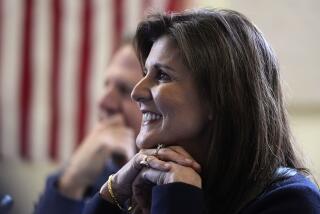Newt Gingrich: ‘Crony capitalism ... is not free enterprise’
- Share via
Reporting from Rock Hill, S.C. — Opening what could be a make-or-break campaign to win South Carolina’s Republican presidential primary, Newt Gingrich defended his criticism of Mitt Romney’s role as an investment banker in corporate buyouts that led to job losses.
“Criticizing specific actions in specific places is not being anti-free enterprise,” the former House Speaker told a crowd that packed a banquet hall here in upstate South Carolina on Wednesday, rejecting Romney’s suggestion that questioning his record as chief executive of Bain Capital was tantamount to attacking free enterprise.
“And crony capitalism, where people pay each other off at the expense of the rest of the country, is not free enterprise,” Gingrich said. “And raising questions about that is not wrong.”
On Tuesday night in New Hampshire, Romney accused “desperate Republicans” of joining forces with President Obama in dividing America “with the bitter politics of envy.”
Another Romney rival for the Republican nomination, Texas Gov. Rick Perry, has been highlighting Bain Capital takeover deals that caused layoffs at two South Carolina manufacturing plants. And a super-PAC that supports Gingrich plans to air a scathing anti-Romney TV commercial on the topic in the days leading up to South Carolina’s pivotal Jan. 21 primary.
Gingrich, who finished in fourth place in the New Hampshire primary on Tuesday and the Iowa caucuses last week, hopes to fare better in South Carolina.
But with Perry, Texas Rep. Ron Paul and former Pennsylvania Sen. Rick Santorum still in the race, South Carolina’s key conservative evangelicals could fracture their support, to Romney’s benefit. The former Massachusetts governor’s strength is in more moderate coastal areas of the state, where former Utah Gov. Jon Huntsman Jr. also hopes to pick up support.
It is a dynamic that Gingrich likely must change quickly if his candidacy is to be viable beyond South Carolina.
“I believe that South Carolinians are either going to center in, and pick one conservative, or by default you’re going to send a moderate on to the nomination,” Gingrich, his wife Callista at his side, told the crowd Wednesday at the Laurel Hill banquet hall.
Gingrich signaled he would focus in South Carolina on what he described as the persecution of Christians, whether by U.S. judges whose rulings constrain church liberties or by repressive regimes abroad.
“If you will help me win this election, we will not tolerate a speech dictatorship in this country against Christianity,” he said, drawing a standing ovation from dozens of the spectators.
Displaying his combative streak, Gingrich took his own party to task as he cast himself as a champion of mainstream Americans cheated by a Wall Street establishment embodied by Romney. His main target was the 2008 government bailout of big banks.
“This is bipartisan,” he said. “The initial wave of money came out under the Bush administration when you had a Goldman Sachs secretary of the Treasury, and a Goldman Sachs chief of staff, and a Goldman Sachs deputy in charge of the bailout – and oh, by the way, when AIG got lots of money, $13 billion of it happened to go to Goldman Sachs.”
“They didn’t bail out a small bank in South Carolina,” he continued. “They didn’t bail out all the folks whose homes were in trouble. ... But boy, if you were big enough, they couldn’t add enough zeros to the check.”
Speaking to reporters afterward, Gingrich said Romney should be called to account for job losses that resulted from deals that spawned big fees for Bain Capital, just as the Federal Reserve should be audited.
“If we’re going to run a presidential campaign based on a record, the record has to be open to review,” he said. “Now, this is not ‘anti-capitalism.’ That is the smoke screen of those who are afraid to be accountable.
“I am for a free-enterprise system. I am for capitalism. I am for entrepreneurship. But I’m also for the American people’s right to understand: What are the games that are being played? How are they being played? Are they fair to the American people? Or in fact, as I think is the case clearly in the money coming out of the Federal Reserve, are there deals being cut by huge institutions and very rich people at the expense of the American middle class?”
michael.finnegan@latimes.com
More to Read
Sign up for Essential California
The most important California stories and recommendations in your inbox every morning.
You may occasionally receive promotional content from the Los Angeles Times.










